2026 Author: Priscilla Miln | miln@babymagazinclub.com. Last modified: 2025-01-22 17:55:13
Parents often think that the child eats very little, and almost all grandmothers consider their grandchildren to be excessively thin and try to feed them as soon as possible. At the same time, the child's body has a developed instinct for self-preservation, so that the baby will eat as much as he needs. But there are cases when the lack of appetite is caused by very specific reasons.
Child nutrition: norms
How much should a child eat? Caring mothers and vigilant grandmothers usually answer that as much as possible, but this is clearly contrary to common sense. Excess nutrition is no less harmful to a growing organism than insufficient nutrition. Most often, adults have a rather remote idea of the amount of food they need.
Pediatricians say a child between the ages of one and three should have four meals a day, including breakfast, lunch, afternoon tea and dinner. At lunch, the body should receive about 40-50% of the total nutritional value of the diet, and the rest is distributed overbreakfast, afternoon tea and dinner. The energy value of products per day should be 1400-1500 kcal.
Causes of lack of appetite
Pediatricians are often approached by worried parents complaining that their child has no appetite. The reasons can be different, there are quite a lot of them and they are all individual. During the formation of the dentition, for example, a decrease in appetite may be associated with the eruption of the next tooth or even several at the same time. It is also pointless to try to feed the baby during an illness, because the body throws all its forces into fighting the infection.
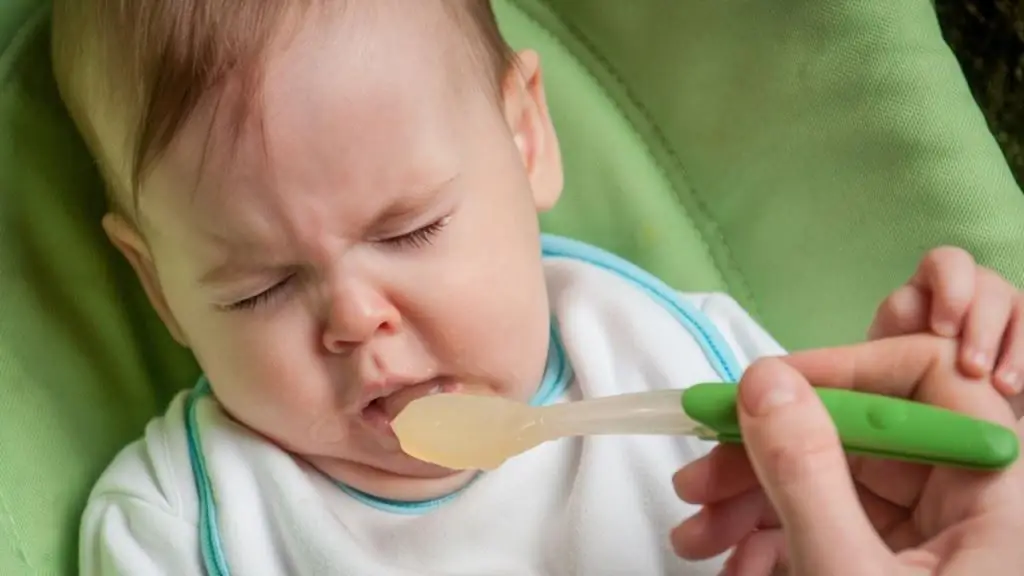
Other causes of loss of appetite in a child:
- monotonous food;
- bad taste characteristics of dishes;
- stay of the child on breastfeeding after a year;
- lack of food culture;
- insufficient physical activity;
- snacking between meals;
- individual characteristics of growth and development;
- psychological problems;
- unsatisfactory general he alth, illness;
- slow growth;
- fear of new foods;
- anorexia nervosa (psychological aversion to food);
- emotional outbursts and stress;
- protest against unloved foods, force feeding;
- taking antibiotics or other medications;
- anemia, helminthiases and other diseases;
- digestion problems, constipation;
- violation of the exchangesubstances, food intolerance;
- external factors (often children refuse to eat on hot days).
Frequent snacks throughout the day
The cause of poor appetite in a child at 2 years old is often constant snacking between main meals. If the baby did not eat well at breakfast, after an hour and a half, the mother will offer him a sandwich or yogurt, after another time - fruits and cookies. For lunch, the child will again refuse the first and second courses.
Snacking breaks the daily routine, discourages appetite and does not contribute to proper digestion. In addition, usually as a snack, the child receives something high-calorie and not at all he althy. The solution to the problem is simple. To have an appetite, you need to stop feeding the child between main meals.
Selective appetite
Children with selective appetites are often referred to as "naughty kids". These babies consume less than 65% of the recommended allowance for their age in four of the six main food groups, including vegetables and fruits, fish, eggs and meat, carbohydrates and legumes, and dairy and sour-milk products.

Features of the behavior of children with selective appetite are long-term retention of food in the mouth, slow pace of eating, eating fatty and sweet foods instead of he althy and complete ones, snacking during the day, unwillingness to try new food, refusal of food of a certain consistency. These trends usually persist throughout childhood.
This cause of poor appetite ina child of 3 years old (or another age) can provoke a lag in physical development and form a chronic stressful situation in the family. So, parents begin to exert psychological pressure on children, which leads to new problems.
How to act if the baby refuses food? To eliminate the cause of a decrease in appetite in a child, parents are advised to:
- Keep positive, don't force your child to eat food they don't like.
- Change your diet. Refusal of vegetables can be compensated by an increase in the number of fruits, some types of meat can be replaced by others. New food should be offered to the child at least 7-10 times with breaks of several days.
- Offer small portions. Instead of one large bowl of soup, you can have a little liquid food for lunch, buckwheat with a piece of meat and an egg or a sandwich.
- Get creative with your diet. Unloved, but he althy foods can be “disguised”, and some children are much more willing to eat not a ready-made salad, but all the ingredients separately. Beautiful children's dishes "work" well. Cooking food together can increase your appetite.
Individual Development
The reason for the lack of appetite in a child may lie in individual characteristics. If the baby is developing normally and gaining weight in accordance with age, and the doctor has not found any abnormalities, then you should not try to force-feed him. Such children usually eat with pleasure, but little (according to parents).

Babies grow very rapidly during their first year of life, but after this intensive period, growth slows down, so food may start to be required a little less. In a year and a half, a decrease in appetite is an absolutely normal phenomenon. In addition, different organisms have different energy requirements, digestion capabilities, and metabolic rates. Therefore, the appetite of children of the same age can vary significantly.
Unbalanced diet
A 5-year-old or any age child may have poor appetite due to an unbalanced diet and other eating disorders. This includes snacking between meals, monotonous diet, tasteless food.
Maybe mom doesn't have enough time for tasty and varied meals. Of course, steamed vegetables and boiled chicken are very useful, but the child will get tired of eating the same thing every day. Products need to be prepared in different ways. A baby can also refuse certain foods if he is fed up with this dish, for example, in a kindergarten.
Lack of exercise
Lack of physical activity is rarely the cause of poor appetite in a 6 year old. At this age, many begin to attend school, so psychological causes and regime change come to the fore. But for schoolchildren with an established regimen or calm kids, a lack of physical activity can be a significant reason for refusing food.
Appetite appears as energy is consumed and the need arises to replenish it. Very rarely, for example,parents of children who regularly play sports complain of refusal to eat. If, due to age or temperament, the baby spends a lot of time in a stroller or in his mother's arms, then he is unlikely to want to eat tightly.
How to solve the problem if the reason for the lack of appetite in a child is precisely the lack of physical activity? You need to walk in the fresh air, try to make the baby run and jump more, you can start attending the sports section. The ratio of physical and intellectual loads should be approximately one to one. Regardless of age, children should spend at least three hours outdoors every day.
Fear of new food
If a child has lost his appetite, the reasons may be physical or psychological. Fear of new food is a psychological feature that makes normal eating much more difficult. This is usually faced by parents of children who are conservative in food and refuse to innovate. As a result, the diet becomes scarce and monotonous.
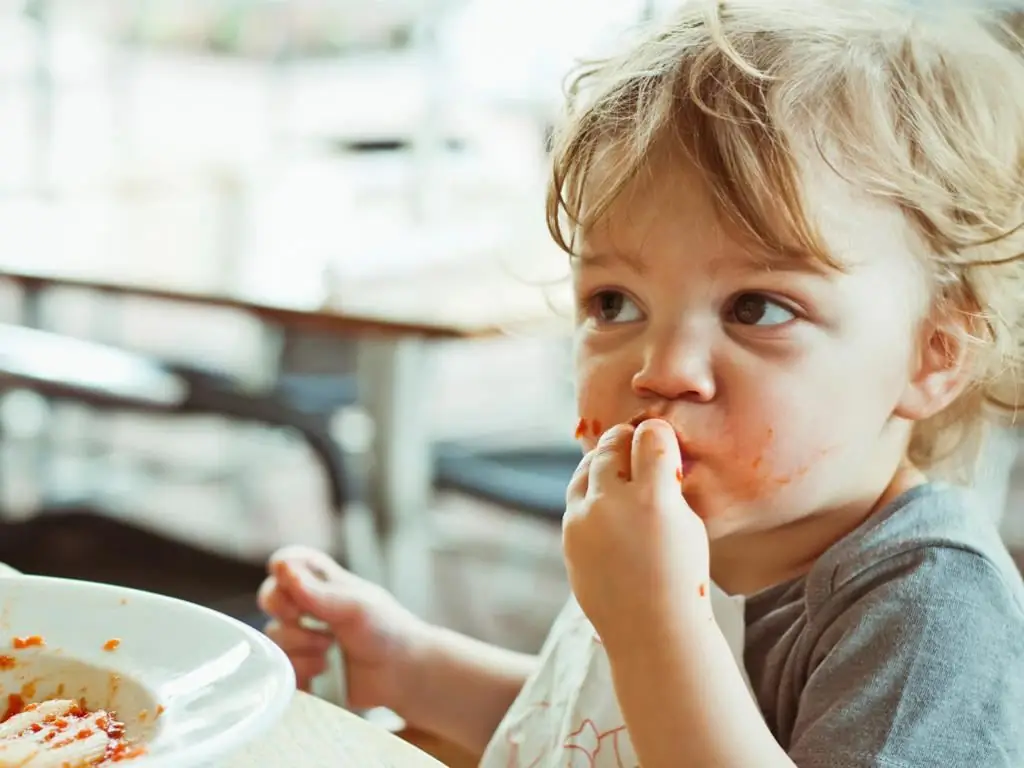
If a child stubbornly refuses a new food, do not rush him and force him to eat by force. After some time, it is worth re-proposing a new product. The child will gradually get used to the appearance and smell of food, dare to try, and parents need to set an example of the use of new products, voicing their feelings and taste of the dish.
By the way, addiction to certain types of food is often explained by the needs of the baby's body, and not by whims. Yes, up to twoyears, children often refuse vegetable dishes in favor of dairy. This is due to the increased need for calcium, which is necessary for the development of the musculoskeletal system and teeth.
Bad appetite in a 7-year-old child (the reasons may be different, it all depends on the situation) is also a manifestation of fear of new food at school. In addition, at 5-7 years old, many children prefer vegetables to dairy products, because the body needs more of a variety of vitamins and minerals. Here is the reason for giving up milk cereals and yogurts.
Force feeding
If a child has no appetite at 2 years old, the reason may be the persistent attempts of parents to feed the baby with he althy foods through force. It is absolutely impossible to do this. Appetite will not appear, and food will not be digested normally.
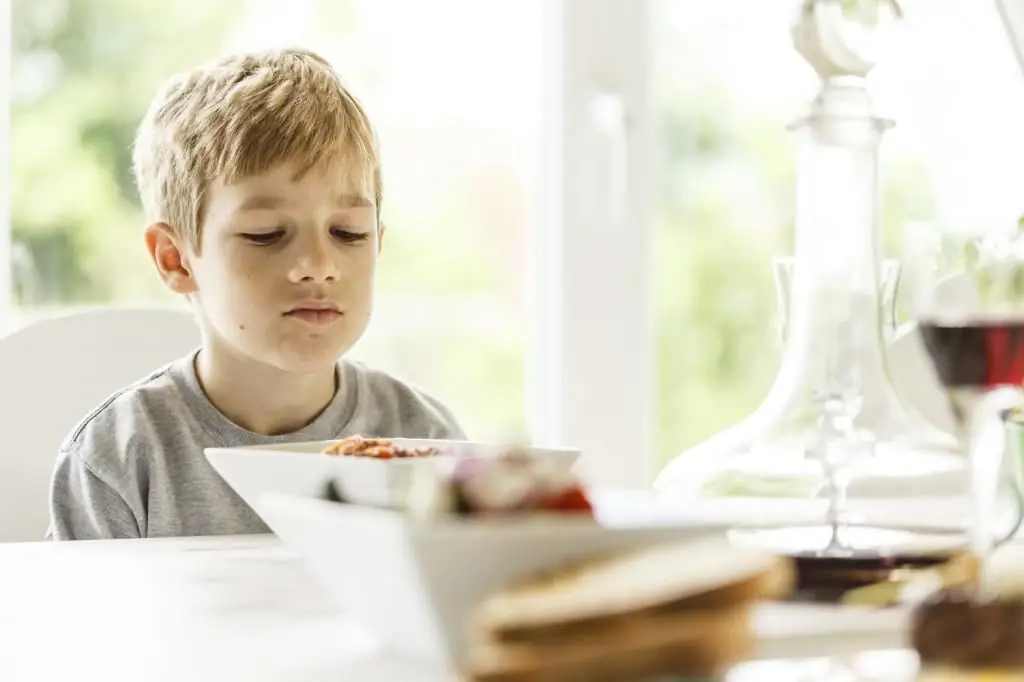
Force-feeding disrupts the motility of the digestive tract and contributes to the development of diseases. Under the threat of punishment for refusing food, a child may develop stomach and intestinal cramps, serious digestive failures, involuntary defecation and vomiting.
What to do to normalize appetite? It is necessary to provide the child with sufficient physical activity, offer a variety of he althy and outwardly attractive dishes, and maintain a positive attitude. In no case should you force the baby to eat. Family dinners “work” well - the child relaxes and eats more than if the attention of a caring mother and grandmother is riveted to him, looks at the positive example of adults whoeat with gusto.
Food intolerance
If a child has lost his appetite, the reasons may be in an unsatisfactory state of he alth. Children tend to refuse food at the onset of a cold or when they feel unwell. It's just that the body at this time is actively fighting an infection or other kind of ailment.
Sometimes there is a malfunction in the production of an enzyme that converts food into nutrients and vitamins. If the enzymes are poorly produced or any of them are not synthesized at all, then this leads to the fact that certain foods cause an upset stomach in the child. For example, with lactase deficiency, the baby will refuse dairy products.

Gastrointestinal disorders
Baby complaining of stomach pain? Does the child have no appetite? The cause is most likely a malfunction of the gastrointestinal tract or food poisoning. To accurately determine the reasons for refusing to eat, you need to contact a pediatrician and a pediatric gastroenterologist. Perhaps the problem can be eliminated with a therapeutic diet. In some cases, medication is needed.
Anorexia nervosa
Among teenagers, a passion for diets is relevant and often there are psychological problems - with a persistent violation of eating habits, these are also common reasons. Does the child have no appetite, does not enjoy food, is he depressed? Perhaps it is just about anorexia.
Anorexia nervosa harms the physical andpsychological he alth. This condition can be caused by severe stress, growing up, divorce by a parent, moving to a new place of residence, or transfer to another school. More often than others, children who lack the attention of their parents face the problem.
Various diseases
If the child does not have an appetite, the reason may be in the presence of any disease. Refusal to eat can be provoked not only by digestive problems or metabolic disorders, but also by anemia, helminth damage to the body, and depression.
When anemia, for example, is characterized by the appearance of symptoms such as weakness, irritability, drowsiness, constant fatigue. To confirm or deny the disease, you need to take a blood test. With helminthiases in children, either a brutal appetite wakes up, or the kids persistently refuse to eat.
Absolutely, with any illness, the body spends all its strength on fighting the disease, so a sick child should not be forced to eat. It is better to make sure that the baby drinks enough fluids. You can offer light broths or nutritious snacks. After recovery, appetite gradually returns to normal.

How to normalize appetite
To address the issue should be approached comprehensively. But you should not escalate the situation if the doctor did not find any abnormalities in the child. Perhaps poor appetite is an individual feature of the baby. Parents need to let go of the situation, take it easier and relax.
Family dinners help shape a positive meal experience, when all family members sit down at the table and talk about different topics. The child relaxes, ceases to be the center of attention and usually begins to eat much better. If the whole family cannot get together for lunch or dinner, then at least mom needs to eat with the baby.
It is worth trying to reduce portions, but diversify the diet. That is, you can offer not one large plate of porridge, but a little porridge, a little bit of vegetables and one ladle of soup. Just do not put all the plates on the table at once. It is better to offer the child dishes in turn.
Be sure to consider individuality. No need to force the baby to eat what he absolutely does not like. It is worth specifying what the child wants for breakfast, lunch or dinner, offer a choice, involve him in the cooking process and make sure that the dishes are beautiful in appearance. The latter is especially important for visual kids.
Recommended:
Redness behind the ear in a child: description of symptoms, causes, possible diseases, consultation of doctors and ways to solve the problem
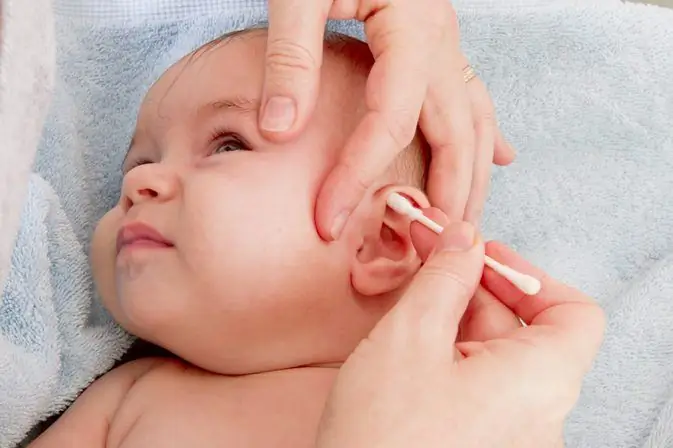
In a child, redness behind the ear can occur at any age, but this happens especially often with babies under one year old. There are many reasons for this condition - from banal oversight and insufficient care to extremely serious diseases. Today we will try to understand the most common factors that provoke the appearance of redness behind the ear in a child, and also find out which doctor you need to go to with this problem
What to do if the child does not want to eat? Causes of poor appetite in children and ways to improve it
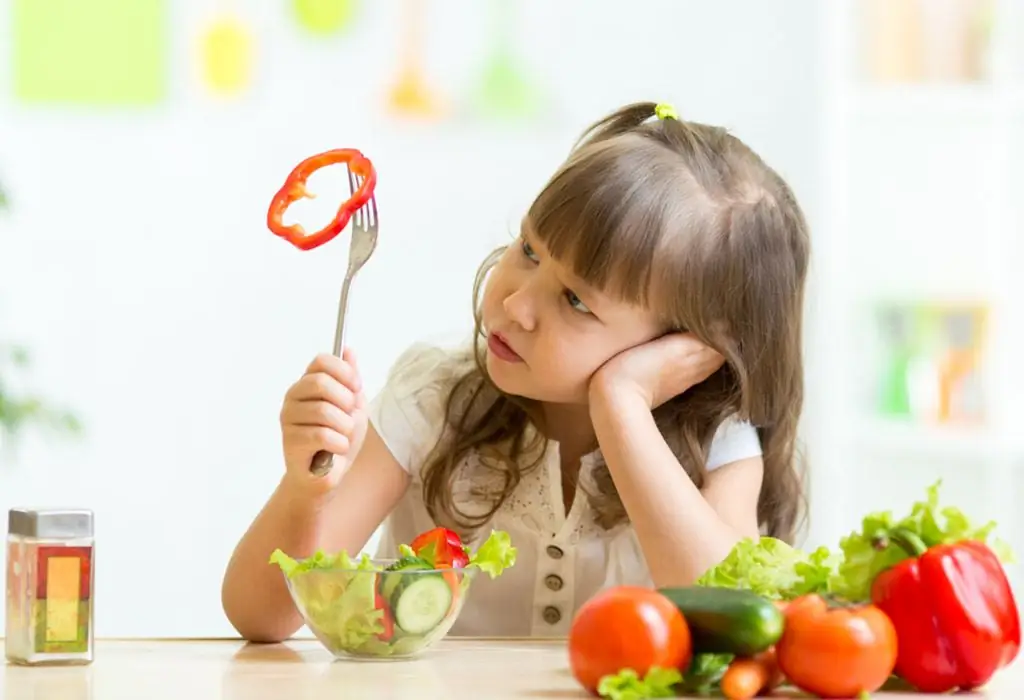
The problem of poor appetite worries many parents. After all, when a child eats the prescribed portion, it gives mom pleasure. If this does not happen, then the parents begin to persuade the baby to finish eating, asking them to eat a few more spoons. When a child constantly refuses to eat, then over time he may experience weakness, poor weight gain and pain
Why a child has black teeth: possible causes, ways to fix the problem
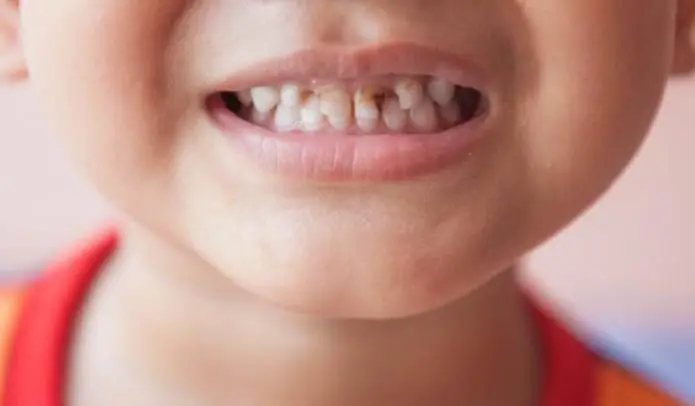
Not always and not all parents immediately notice blackening on children's teeth. Blackness appears in children older than two years. Why do children have black teeth? And how to deal with this problem?
No appetite during pregnancy: causes, consequences, ways to restore appetite

Many people are accustomed to hearing that the expectant mother should eat for two. But very often a woman in anticipation of a baby and for herself alone is not always able to properly eat. A frequent and rather unpleasant phenomenon when there is no appetite during pregnancy. Why is this happening, should you be very worried about it, and most importantly, what to do in such a situation?
What to do if a child has no appetite: causes, effective solutions, advice from pediatricians
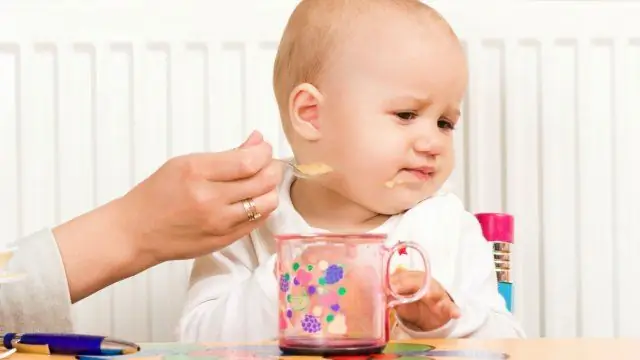
An excellent appetite in a child is a guarantee of a good mood for parents. There is nothing more pleasant than watching a baby gobble up a freshly prepared breakfast, lunch or dinner on both cheeks. But more often than not, the opposite is true. The baby flatly refuses to eat what mom or grandmother has prepared. About what to do if the child has no appetite, we will tell in our article. We will definitely dwell on effective methods for solving this issue and present recommendations from the well-known pediatrician Komarovsky E. O

